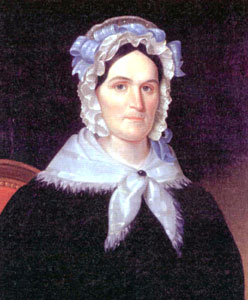
Ann Philips Rogers Grundy
Ann Rogers Grundy was born December 8, 1779, in Lunenberg County, Virginia, to John and Sarah Dougherty Rodgers. She married lawyer Felix Grundy on May 11, 1797, in Springfield, Kentucky. In 1808 she and her husband moved from Bardstown, Kentucky, where he served as chief justice of the Kentucky Supreme Court to Nashville, where he became the law partner of James K. Polk.
Ann Grundy joined the First Presbyterian Church of Nashville shortly after it was organized and became active in its women’s activities. In 1817 she and other women in the church organized the Female Bible and Charitable Society of Nashville. Patterned after a similar organization in Philadelphia, the society distributed Bibles and clothing to the poor of the city. In 1820, the year that Grundy gave birth to her tenth child, she joined forces with Reverend Samuel P. Ament, a Methodist minister who had recently moved to Nashville, to begin a nondenominational Union Sunday school to provide instruction for poor children whose parents could not afford to send them to school or to church. A deeply religious woman, Grundy believed that the Bible could not be properly understood by persons who were unable to read it.
The Sunday school met outside near the center of town every Sunday morning while the weather permitted. Each session consisted of Bible study and spelling class based on the Bible and Webster’s Bluebacked Speller; lessons were interspersed with prayers and hymn singing. Since the school had to dismiss in the winter because of the weather, its sponsors requested permission to meet in one of the local churches, but none would allow the program inside its facilities. Many church leaders criticized the Sunday school as a violation of the Sabbath since the teaching of spelling and reading were secular projects inappropriate for Sunday. Nashville ministers preached sermons which described the Sunday school as “a scheme of the devil to capture the youth of the city.” The minister of McKendree Methodist Church eventually adopted the program, though, and within three years every church in Nashville sponsored a Sunday school where students were required to read the Bible and memorize Bible verses. Grundy’s own church, First Presbyterian, later established other Sunday school missions around the city which later became Presbyterian churches.
Active in other voluntary women’s organizations, as well as her church-related associations, Grundy was among the original board of managers of the House of Industry for Females. This institution, organized in 1837, provided a home for orphan girls and young women and gave them marketable domestic skills as an alternative to prostitution. In the 1890s the Young Women’s Christian Association continued this work.
Ann Rodgers Grundy’s daughters and later descendants followed her example by working in numerous charitable endeavors and voluntary associations in Nashville. When Grundy died on January 27, 1847, her obituary in the Republican Banner listed none of her accomplishments and said only that she was “Mrs. Grundy, widow of the late Honorable Felix Grundy, a lady universally respected and beloved.” She is buried in the Grundy family plot at Mt. Olivet Cemetery.



